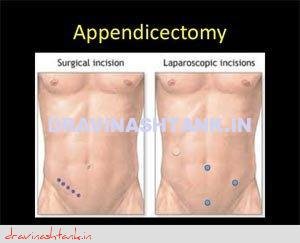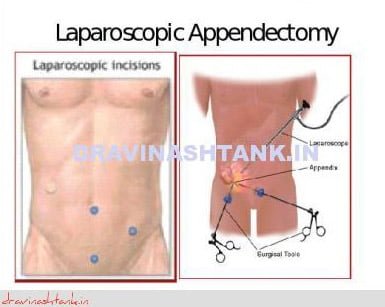Real vs. Fake Paneer (Analogous Paneer): How to Identify and Health Risks
Reading Time: 4 minutes Spread the love Real vs. Fake Paneer (Analogous Paneer): How to Identify and Health Risks. Paneer is a staple in Indian households, known…
Dr AvinashTank, is a super-specialist (MCh) Laparoscopic Gastro-intestinal Surgeon,
Appendix is a vestigial organ in human being, attached to right colon.
The appendix produces a bacteria destroying protein called immunoglobulins which help fight infection in the body. Its function, however, is not essential. People who have had appendectomies do not have an increased risk toward infection. Other organs in the body take over this function once the appendix has been removed.
Appendicitis (infection of appendix) occurs when the appendix becomes blocked, often by stool or as a result of infection in body, since the appendix swells in response to any infection in the body. In elderly person, it may be blocked by tumor, thus requiring proper evaluation before going for surgery.

Appendicitis is usually diagnosed by clinical & rectal examination and supported with blood, urine and USG/CT scan.
Appendicitis is a medical emergency that requires prompt surgery to remove the appendix. We have the best appendix surgeon in Ahmedabad who can treat you well. Left untreated, an inflamed appendix will eventually burst, or perforate, spilling infectious materials into the abdominal cavity. This can lead to peritonitis, a serious inflammation of the abdominal cavity's lining (the peritoneum) that can be fatal unless it is treated promptly.
The treatment for appendicitis usually is antibiotics and appendectomy (surgery to remove the appendix).
If appendicitis is even suspected, its better to err on the side of safety and quickly remove the appendix to avoid its rupture. If the appendix has formed an abscess, it may need two procedures: one to drain the abscess of pus and fluid, and a later one to remove the appendix.
A cannula (hollow tube) is placed into the abdomen and abdomen will be inflated with carbon dioxide gas to create a space to operate. A laparoscope (a tiny telescope connected to a video camera) is put through one of the cannula which projects a video picture of the internal organs and appendix on a television monitor. Three cannulas are placed in different locations on your abdomen to allow surgeon to place instruments inside your belly to work and remove your appendix. After appendix is cut from all that it is connected to, it is placed inside a special bag & is pulled up into one of the incision and taken out.
Common advantages of laparoscopic appendectomy are: Less postoperative pain, shorten hospital stay, quicker return to bowel function, quicker return to normal activity & better cosmetic results

in most cases, you will need some tests before your surgery. The tests routinely used include:
Our expert team of Anaesthetist will ask you questions pertaining to your health and to assess your fitness for surgery. You are requested to tell them in detail about your current and past medical ailments, allergic reactions you’ve had in the past and current medicines that you are taking like blood thinning medicine. This medicine should be stopped prior to surgery to minimize the risk of bleeding during /after surgery.
Anaesthesia is the use of drugs to make the body unable to feel pain for a period of time. General anaesthesia puts you into a deep sleep for the surgery. It is often started by having you breathe into a face mask or by putting a drug into a vein in your arm. Once you are asleep, an endotracheal or ET tube is put in your throat to make it easy for you to breathe. Your heart rate, breathing rate, and blood pressure (vital signs) will be closely watched during the surgery. A doctor watches you throughout the procedure and until you wake up. They also take out the ET tube when the operation is over. You will be taken to the recovery room to be watched closely while the effects of the drugs wear off. This may take hours. People waking up from general anaesthesia often feel “out of it” for some time. Things may seem hazy or dream-like for a while. Your throat may be sore for a while from the endotracheal (ET) tube.
Informed consent is one of the most important parts of “getting ready for surgery. It is a process during which you are told about all aspects of the treatment before you give written permission to perform the surgery.
Depending on the type of operation you have, there may be things you need to do to be ready for surgery:

You may feel pain at the site of surgery. We aim to keep you pain free after surgery with the help of latest and most effective technique or analgesic (pain relieving medicine).
You will be allowed orally liquids once you recover from effect of anaesthesia medicine and you don’t have nausea or vomiting. Gradually you can add soft to normal diet.
Our health care team will try to have you move around as soon as possible after surgery. You are encouraged to get out of bed and walk the same day. While this may be hard at first, it helps speed your recovery. It also helps your circulation and helps prevent blood clots from forming in your legs.
There are risks that go with any type of medical procedure and surgery is no longer an exception. Success of surgery depends upon 3 factors: type of disease/surgery, experience of surgeon and overall health of patients. What's important is whether the expected benefits outweigh the possible risks.
Our health care team shall advise you in detail regarding dietary habits, Briefly, your diet begins with liquids followed by gradual advance to solid foods.
Patients are encouraged to engage in light activity while at home. You will be able to get back to your normal activities within a short amount of time (week).
You may be advised to see our health care team after 1 week to assess your progress and to address your problems.

Experience
Award & Presentations
Satisfied Families
Successful Surgeries

Endoscopy
Reading Time: 4 minutes Spread the love Real vs. Fake Paneer (Analogous Paneer): How to Identify and Health Risks. Paneer is a staple in Indian households, known…
Reading Time: < 1 minute Spread the love Anti-Cancer Indian Diet. Here’s the content from the uploaded notes organized into a proper list in both Hindi…
Reading Time: 3 minutes Spread the love “नई जिंदगी की शुरुआत: 70 साल की बुजुर्ग महिला की कहानी” श्रीमती कमला देवी, 70 साल की उम्र में…